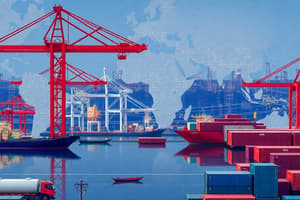Podcast
Questions and Answers
What is the significance of Thomas Jefferson's view on history as it relates to American identity?
What is the significance of Thomas Jefferson's view on history as it relates to American identity?
- It reflects a desire to form a new identity separate from European history. (correct)
- It indicates that learning from past mistakes is crucial. (correct)
- It emphasizes the importance of studying ancient civilizations.
- It suggests that history is irrelevant for future generations.
What does Hegemonic stability theory primarily focus on?
What does Hegemonic stability theory primarily focus on?
- The stability provided by a dominant state in the international system (correct)
- The role of individual motivations in governance
- The importance of cultural influences on economic theory
- The influence of local policies on global economics
How can economic crises influence protectionist policies according to historical examples?
How can economic crises influence protectionist policies according to historical examples?
- They often result in nativist and nationalist reactions. (correct)
- They lead to increased international cooperation.
- They create opportunities for market monopolies.
- They prompt countries to adopt more liberal trade practices.
What does the phrase 'marriage of iron & rye' signify in historical context?
What does the phrase 'marriage of iron & rye' signify in historical context?
Which theory emphasizes the importance of factor endowments in trade?
Which theory emphasizes the importance of factor endowments in trade?
What is the main concern of Dependency Theory?
What is the main concern of Dependency Theory?
What do political and economic theories aim to achieve in the context of social phenomena?
What do political and economic theories aim to achieve in the context of social phenomena?
What is the primary objective of the New International Economic Order?
What is the primary objective of the New International Economic Order?
Which statement aligns with the views reflected in modern globalization discussions based on the content?
Which statement aligns with the views reflected in modern globalization discussions based on the content?
What does 'beggar-thy-neighbor' refer to in the context of economic policy?
What does 'beggar-thy-neighbor' refer to in the context of economic policy?
Which concept is NOT a primary focus of Lenin's Theory of Imperialism?
Which concept is NOT a primary focus of Lenin's Theory of Imperialism?
Which of the following best describes World Systems Theory?
Which of the following best describes World Systems Theory?
Which approach is commonly associated with interpreting economic behavior according to game theory?
Which approach is commonly associated with interpreting economic behavior according to game theory?
How does Marxist Economic Policy propose to achieve economic equality?
How does Marxist Economic Policy propose to achieve economic equality?
What is a core principle of Dependency Theory as it relates to global economics?
What is a core principle of Dependency Theory as it relates to global economics?
What role do statistics play in social sciences according to the discussed theories?
What role do statistics play in social sciences according to the discussed theories?
What primarily determines the behavior of individuals and groups in society according to Marxism-Leninism?
What primarily determines the behavior of individuals and groups in society according to Marxism-Leninism?
What aspect of international relations does constructivism focus on?
What aspect of international relations does constructivism focus on?
Which theory argues that states are often reflections of the interests of the ruling class?
Which theory argues that states are often reflections of the interests of the ruling class?
What does the New International Economic Order primarily aim to address?
What does the New International Economic Order primarily aim to address?
Which of the following concepts is best associated with Dependency Theory?
Which of the following concepts is best associated with Dependency Theory?
What economic policy is often linked to Marxist thought?
What economic policy is often linked to Marxist thought?
In World Systems Theory, which type of nations are characterized as having a dominant position in trade and economics?
In World Systems Theory, which type of nations are characterized as having a dominant position in trade and economics?
What event marked the rise of protectionism following the Great Depression of the late 1920s?
What event marked the rise of protectionism following the Great Depression of the late 1920s?
Flashcards
Social science research methods
Social science research methods
Approaches for investigating human behavior and society, including inductive, interpretive, and psychoanalytic perspectives.
Falsifiable arguments
Falsifiable arguments
Research arguments that can be proven wrong based on evidence.
Qualitative data
Qualitative data
Non-numerical information used to understand a social phenomenon.
Quantitative data
Quantitative data
Signup and view all the flashcards
Controlled experiments
Controlled experiments
Signup and view all the flashcards
Statistical analysis
Statistical analysis
Signup and view all the flashcards
Public policy
Public policy
Signup and view all the flashcards
Hegemonic stability theory
Hegemonic stability theory
Signup and view all the flashcards
Globalization: New or Old?
Globalization: New or Old?
Signup and view all the flashcards
Corn Law Debates
Corn Law Debates
Signup and view all the flashcards
Great Depression of the 1870s
Great Depression of the 1870s
Signup and view all the flashcards
Protectionism
Protectionism
Signup and view all the flashcards
Nativism
Nativism
Signup and view all the flashcards
Smoot-Hawley Tariff Act
Smoot-Hawley Tariff Act
Signup and view all the flashcards
Beggar-Thy-Neighbor Policies
Beggar-Thy-Neighbor Policies
Signup and view all the flashcards
Bretton Woods System
Bretton Woods System
Signup and view all the flashcards
Realism in IR
Realism in IR
Signup and view all the flashcards
Idealism in IR
Idealism in IR
Signup and view all the flashcards
Liberalism in IR
Liberalism in IR
Signup and view all the flashcards
Marxism-Leninism in IR
Marxism-Leninism in IR
Signup and view all the flashcards
Constructivism in IR
Constructivism in IR
Signup and view all the flashcards
Great Depression
Great Depression
Signup and view all the flashcards
Study Notes
International Political Economy (IPE)
- IPE is a course about how the world works, encompassing every aspect of modern life.
- It requires a systematic approach due to its all-encompassing nature.
- Key components include definitions, theories, and concepts related to globalization and exchange.
- Examples of IPE topics include trade and flows of capital/money, international migration, and the explosion of information.
Subtopic: Politics and Economics
- Politics is defined in terms of power relationships and authority.
- Economics is defined in terms of exchange/transnational relations.
- All political systems are characterized by certain features like institutions, laws, and processes.
Subtopic: A Typology of Political Economies
- A typology of political economies is presented based on factors like power, authority, and rights.
- Examples of political economies include unregulated (autocracies, totalitarian states, and liberal democracies) and regulated types (social democracies).
- The typology visualizes how countries fit within the different categories.
- An example is the location of the US in the typology quadrant.
Subtopic: International Dimension of Politics
- IPE is about power, as the lack of a global authority leads to conflict and struggle for power.
- Realist thought suggests the concept of international anarchy, a system structured by conflict and power struggles.
- Idealist or liberal thought emphasizes the importance of rules, international law, international organizations, and cooperation among states.
Subtopic: Players in the International Political Economy (IPE)
- Players in IPE include states, individuals, multinational corporations, and non-state actors (NGOs, terrorist groups, and social activists).
- The perspectives on players depend on the philosophical view, from a political perspective, economic perspective, or social perspective.
- Examples of individuals involved in shaping IPE include Bill Gates, George Soros, and others.
Subtopic: How States Govern the International Political Economy (IPE)
- The global economy has been organized in at least four ways throughout history.
- Imperial systems (e.g., Rome) extract tribute from colonies and organize around military force.
- Mercantilist empires focus on accumulating wealth from colonies. Colonial systems also establish trade relations and seek to control resources.
- Hegemonic systems (e.g., Pax Britannica/Pax Americana) are characterized by a dominant power establishing the rules for the global economy.
- A system of collective security (e.g., the UN) attempts to maintain peace and cooperation among states.
Subtopic: International Political Economy (IPE) Theory
- IPE theory can be approached through various theoretical lenses like mercantilism, liberalism, Marxism-Leninism, and constructivism.
- Different theoretical perspectives in the context of international relations involve unique understandings and assumptions. Each perspective has its own set of underlying assumptions and provides different frameworks for understanding global political economy.
Subtopic: Trade and Comparative Advantage
- Comparative advantage is a theoretical model describing specialization and international trade, explaining how trade benefits all participants (despite potentially losing in 'absolute terms').
- Trade benefits through specialization in production. Based on the concept of opportunity cost, trade enables countries to produce and trade what they are better at producing relative to the cost in other countries
- Comparative advantage is used to determine what a country should specialize in or to determine who benefits from trade or what countries should specialize in what goods to increase production.
Subtopic: Critiques of International Political Economy (IPE) Theory
- The critiques arise out of inherent conflicts within particular theoretical models
- The critiques range from specific issues like assumptions about human behavior, to broader issues of how theoretical models should be tested and used to generate inferences about the world.
Studying That Suits You
Use AI to generate personalized quizzes and flashcards to suit your learning preferences.
Related Documents
Description
Explore the significant theories and historical contexts that shape our understanding of political economy and American identity. This quiz covers key concepts such as hegemonic stability theory, protectionist policies, and the Dependency Theory. Test your knowledge on influential figures and theories that have defined economic and political landscapes.




